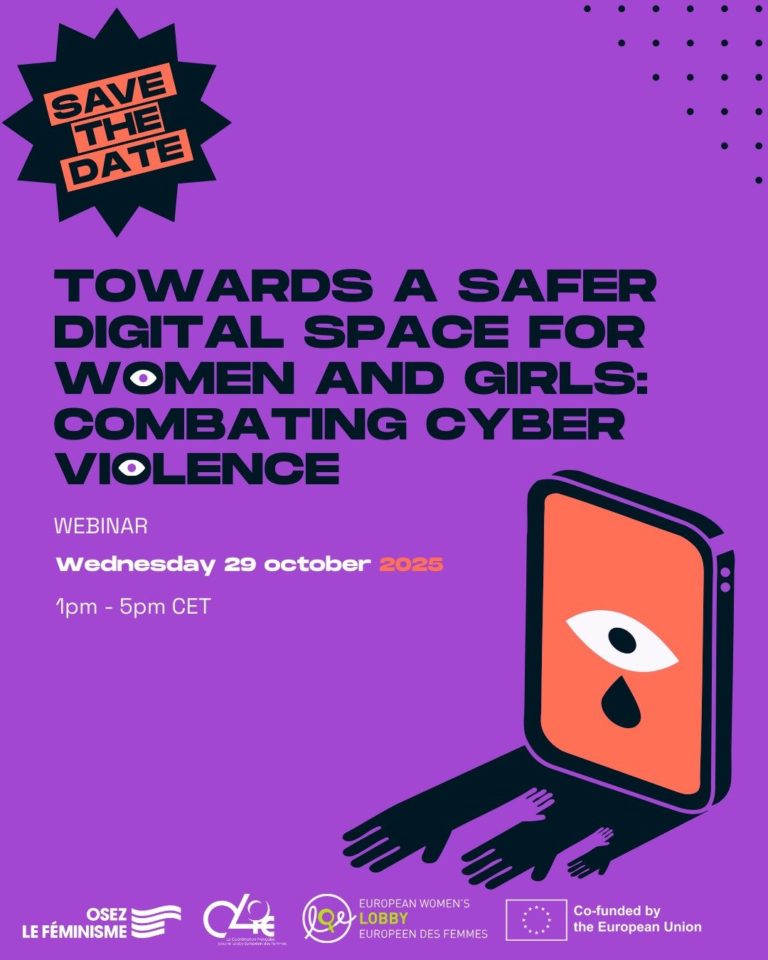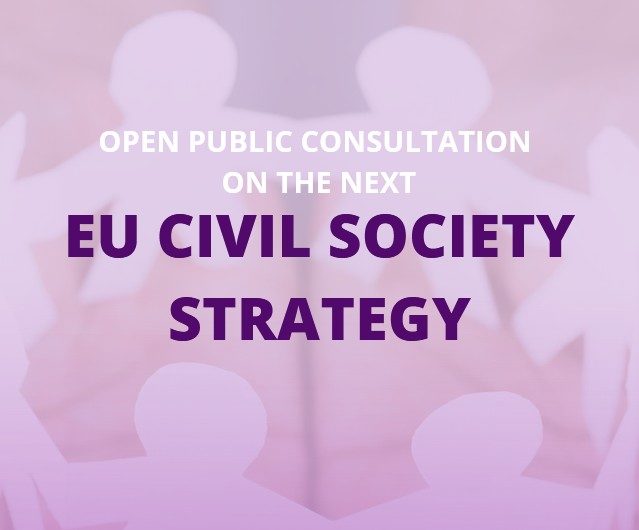In 2016 we had some incredible successes in our fight for gender equality in Europe.
Empowering Young Feminist Leaders
In 2016 we held our second AGORA young feminist summer school, bringing 50 women under the age of 30 together for three days of invigorating, and participatory training on feminist activism and leadership. After participating in the AGORA summer school, the participants have gone on to contribute to a blog started by the first AGORA alumnae group, and continue their activism through online networking. AGORA was cited by the European Commission as an example of a best practice in their 2016 Report on Gender Equality in the European Union.
Amplifying the Voices of Refugee Women
The #womensvoices project was a unique and impactful project led by the European Women’s Lobby (EWL), in partnership with the Women’s Refugee Commission and the European Network of Migrant Women. Building on EWL’s work on male violence and on asylum, our bottom-up project delivered strong recommendations to answer to the violation of refugee women’s human rights. While women and girl refugees face male violence on the move, we gave visibility to their reality and successfully brought the issue on the EU agenda: we see now an expanding interest of EU and national decision-makers to use our check-lists to engender the humanitarian answer and the asylum policies, in order to end violence against migrant women and girls.
Advocating for the Adoption of the Nordic Model on Prostitution
Our advocacy helped lead to France and Ireland’s adoption of the Nordic model on prostitution, an enormous success in terms of protecting women from male violence: while supporting women and girls trapped in the sex trade by offering them alternatives exit routes, the French and Irish laws will have a strong impact on mentalities towards gender equality through the criminalization of the purchase of sex and the establishment of equality classes. They will also contribute to the EU goal to reduce trafficking by deterring sex traffickers to operate in their countries, where benefits won’t be attractive anymore thanks to the new law provisions.
Promoting Women in Political Decision-making
In 2016, EWL, the German Marshall Fund and US organisation Reflective Democracy held ExCHANGE, the first-ever transatlantic conference on women in politics, hosting 40 leading activists working on advancing women’s role in politics from the US and the EU in Brussels for an intense week of best-practice sharing, trainings, and workshops. Participants learned to “copy and customize” practical strategies for change from different areas in the world, and helped analyze and strategize how to promote women’s political leadership in both the US and EU in a uniquely challenging political environment.
Advancing Women’s Socio-economic Independence
On International Women’s Day 2016 the European Women’s Lobby (EWL) launched its Campaign ‘Together we can make it happen, Equal Pension Rights for Women Now!’ The campaign drew attention to the blatant discrimination that women face as they age. The accompanying video clip showed that the entrenched male bread-winner model requires robust measures to move towards an equal earner-equal carer model for the Europe of tomorrow while safeguarding women’s pension rights today
EWL and Women in Development Europe+ (WIDE+) organized a successful two-day international conference to develop a consistent feminist analysis on these global developments faced by Europe. The conference served as a space for civil society, women’s rights experts, activists and policy makers to deepen and broaden their understanding of the current situation in Europe from a feminist perspective in an international exchange with women’s human rights activists from the Global South who have been dealing with similar challenges for a long time. It aimed at shaping strategies for policy intervention, thinking out of the neoliberal box and countering neo-conservative and right-wing political forces, with panels and workshops exploring the ways in which social justice, gender equality and women’s rights are affected, sacrificed or squeezed.
Resourcing the Women’s Movement
In 2016, EWL began position itself as a leader amongst global actors who are collectively advocating for more and better funding for women’s movements around the world. The EWL met with a number of organisations doing work on this topic to share best-practices and reflect on how to most effectively cooperate, and began developing advocacy tools and strategies which will continue to be rolled out in 2017.
EWL travelled to Brazil to lead a session at the 2016 AWID (Association for Women’s Rights in Development) Forum titled “Competition or cooperation in financing women’s rights organisations? Implications of the SDGs agenda for global women’s solidarity” in collaboration with Womankind Worldwide, Saathi Nepal and the African Women’s Development Fund.
Giving Viability to Women Social Entrepreneurs
This year, we undertook our ground-breaking WEstart study on women-led social enterprise in two new countries: Belgium and Luxembourg, increasing the visibility of women’s leadership in social enterprise, and demonstrating that women are at the forefront of a new movement for sustainable business. We also premiered a new short video explaining the outcomes of our 2015 EU-level project, which was premiered at the Impact 2 social enterprise conference at the Hotel de Ville in Paris in front of two thousand social enterprise stake holders.
EWL at the EU Level
Thanks to EWL’s continued advocacy work, Kristalina Georgieva, the European Commission’s budget and human resources chief stated publically that she would order a “freeze” on the hiring of men in the institution unless some of its departments gave more top jobs to women. The European Commission had sought to increase the number of women in senior positions in the institution to 40 percent by 2019, but is behind track in many key areas.
On the 8 of March 2016, the European Commission proposed the EU to sign and conclude the Council of Europe Convention to combat violence against women and girls. The proposal of the Commission was sent to the European Parliament and the Council of the European Union.
On 25 November 2016, the European Commission announced that 2017 was marked as year of focused actions to combat violence against women and girls.
This year, EWL continued to gain recognition for its leadership role in leading strategic civil society reflection on the future of the EU and future of civil society, and was invited into new spaces focusing on industry, economics, and tax to strengthen gender perspectives. EWL continues to be one of several key civil society voices in EU-level and National-level policy dialogues, and is frequently consulted to contribute to the drafting of legislation.
Together with the European Movement, the EWL co-hosted the first Women of Europe Award Ceremony, celebrating the leadership of European Women in both civil society and public political leadership, and publically drawing attention. The award ceremony brought together a diverse mix of leadership from numerous sectors, and raised awareness of the important role women play in promoting a strong European Union.
EWL also hosted its much-loved annual St. Nicolette feminist holiday event, with 2016 taking the format of a special presentation of the arts, with performances by slam poets, authors, artists, film-makers and musical artists.
Internal Achievements
In addition to our external achievements, EWL also experienced strong and positive growth and development within the organisation.
Enhancing Membership Engagement, Working Groups, and Communications
The Membership team developed a Members’ Engagement Strategy, an innovative set of structures and tools for our wide and diverse network of organisations from all across Europe to become a united feminist voice. We strategized with all our members and include different voices, and are one of the first organisations in Europe to work on such Strategy.
We launched a new internal server for our 2,000 member organisations, called the Living Room, which will dramatically enhance the ability of our members across 31 countries to communicate, collaborate, and exchange information.
We elected a new Executive Committee of our Board, the EWL’s Observatory on Violence Against Women was updated and strengthened, and we expanded our thematic working groups.
Our external communications continued to expand in a dynamic way: our social media outreach includes over 33,000 Facebook Followers, and over 11,000 Twitter Followers. EWL Secretariat staff were featured in numerous publications, including the Guardian, the Christian Science Monitor, the Huffington Post, Buzzfeed etc. and were interviewed on National radio and television programmes throughout Europe.
Sustaining and Growing Fundraising and Finance
EWL reached and exceeded its 2016 fundraising goals, enabling us to reduce our financial dependency on the European Commission by 4%, as well as to grow our reserve for the first time in 15 years. Corporate donors increased by 150%, and funding sources were diversified in line with our Financial Resilience and Sustainability Plan. Over twenty new donors were cultivated, including new government funders. We again received an excellent financial audit report, and look forward to managed growth in 2017.


